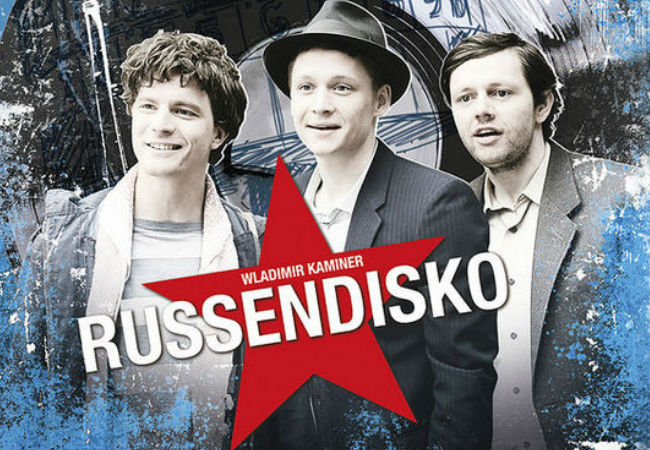
Ah, the promise of the new frontier.
It has drawn people like moth to a flame throughout the history of humanity, with the downtrodden and beleaguered, the lost and the merely curious, pulling up sticks and heading for the bright lights of whatever promised land happened to be in vogue at the time.
And while Berlin in 199o, in the immediate aftermath of the fall of the Berlin Wall, may not look like any sort of Xanadu we’re with, to three young close-as-brothers friends from Russia – Wladimir Kaminer (Matthias Schweighöfer), Mischa (Friedrich Mücke) and Andrej (Christian Friedel) – it is a veritable paradise on earth, with opportunities ripe for the picking.
Not that it works out quite as smoothly as they initially envisage, but buoyed by hope, powered by the promise of a new life, and with each other as unfailing moral support, they dive right into the exhilarating world of a city and country struggling to define itself after decades under Soviet rule.
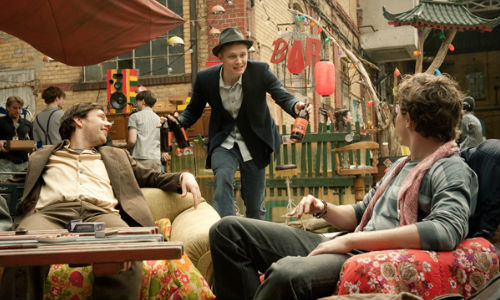
And it seems nothing can dampen their spirits.
Not even lost (and eventually regained) love, blocked or hazily-sketched out career paths, interesting living conditions (the hostel where they are first put up is filled with a riot of different nationalities each with their own quirks), and intermittent reminders of home.
No, the boys are largely unbreakable it seems – although Andrej at one point does decide to return to Russia, homesickness trumping the now slightly-tarnished glittering promise of a new tomorrow – with Wladimir in particular refusing to concede to any doubt or recrimination, even as he struggles to work out what it is he wants to become in this new world has has embraced with gusto.
In the end who he wants to be largely finds him when he discovers a disused function room at the local watering hole they have adopted, which is run by a fellow Russian immigrant who functions as a surrogate father to the many young Russians who have flocked to Berlin, and starts holding Russen Diskos or Russian Discos, using his old record collection for music and mining an odd nostalgia for life before the Wall came tumbling down.
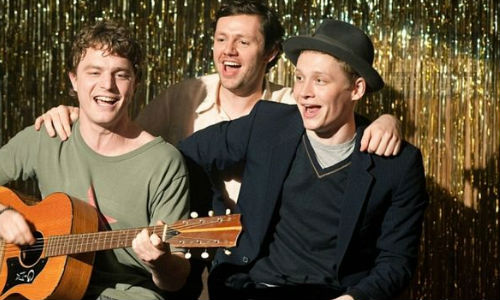
Based on the bestselling memoir by author and disc-jockey Wladimir Kaminer, which brings together a series of short stories about his early days in Germany, Russendisko is suffused with the boys’ youthful Teflon-coated exuberance and endless good humour, which seems to rebuff any setbacks with ease and endless glass-half-full optimism.
That’s not to say that everything runs smoothly for the boys who encounter a turf war of sorts with the Vietnamese gangs selling contraband cigarettes – they begin their adventures in unbridled capitalism selling alcohol and cigarettes on a local busy thoroughfare – end up living in their cheaply-bought car on the docks, and stumble badly when affairs of the heart became messily entangled with the legalities of staying in Germany permanently, but by and large theirs is a trouble-free existence.
Front and centre of this tale is of course Wladimir, who approaches every challenge in life with the full expectation that it will work out in his favour.
It’s not arrogance at all; simply an overwhelming sense of confidence that life in post-Soviet rule East Germany and just prior to its sublimation into the greater German nation on October 3, 1990, carries with it far more promise than life in his homeland does at that point.
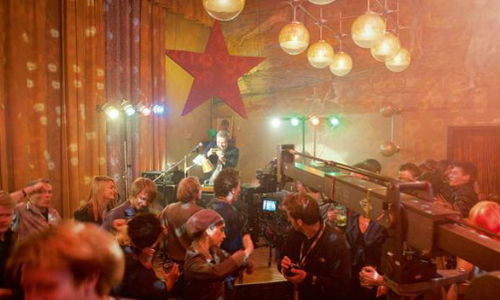
Russendisko, which suffers slightly from an uncertainty about whether its a romantic comedy – much of the narrative revolves around Wladimir’s pursuit of the lovely, talented sometime-dancer Olga (Peri Baumeister) or an ensemble piece about three young friends looking for a chance to build a better life, is a warm, funny, highly-engaging movie.
Largely a series of loosely linked stories, much like the book itself, it succeeds largely because of the irrepressible dynamism and charisma of its star Matthias Schweighöfer who invests Wladimir with such an infectious, boundless enthusiasm for life that you can’t help but be swept in his pursuit of life in an exciting new world.
While Andrej and Mischa are relegated to second banana status at times by the sheer force of Wladimir’s presence, they nonetheless are integral to the story since much of what drives the young hero of the story is his friendship with these two young men and the support they provide to each other.
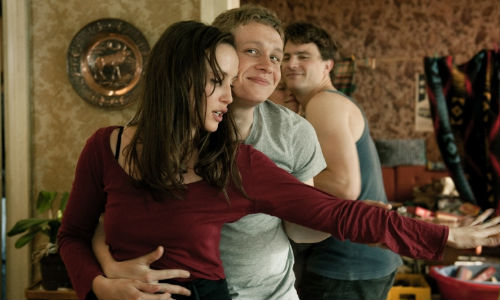
It is this tight bond of friendship, and the witty one liners, and sense of supportive intimacy that it provides that gives Russendisko much of its warmth and good humour, and which links together a series of vignettes which might otherwise feel a little disjointed.
Russendisko is at heart proof positive that if you’re going to give up everything you know and love for the promise of life in the new frontier, that it pays to have close friends at your side, a sense of mischievous optimism coursing through your veins, and perhaps most importantly, a sense of overwhelming manifest destiny at your back.
The rest, it seems, will take care of itself.